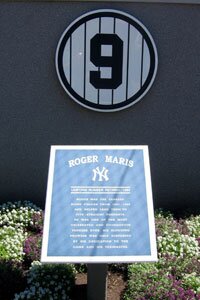THE SPORTS DOCTOR- Where's Roger? Why no Maris in Hall of Fame?

Maris was good enough for Memorial Park, so why not the Hall?
PHOTO BY WALLY GOBETZ
It's that time again: awards season. Every year it's the same: the manufactured hoopla (how much can one really care about Kanye West?), the obscure new honors (ever heard of the Mobile Excellence Awards?), and the pity (Heath Ledger, really?). The Grammys and the Oscars may be the most hyped, but they don't compare to sports for gross injustice.
I'm not referring to Graham Harrell, although you may think the Heisman committee blatantly snubbed the Texas Tech quarterback. No, if you want true grossness, you have to look to Cooperstown and the National Baseball Hall of Fame.
Gil Hodges
Joe Torre
Ron Santo
Tony Oliva
You may not be able to pick Gil Hodges out of a line-up, but even the Amish know he played baseball. The same goes for Joe Torre. Ron Santo and Tony Oliva may be relatively unknown outside the baseball community, but their contributions to the sport are legendary. Why aren't these men in the Hall of Fame?
Good question. A better question might be why is Joe Gordon in it?
To understand, one must know a little about the Hall of Fame. After a player has been retired five years, he has a finite number of chances to be voted in by the Baseball Writers Association of America, an organization known for holding grudges. Only after 15 gut-wrenching years is a player finally evaluated by his peers. The Veterans Committee, the assemblage of last resort, was designed to offset the BWAA's influence. As if.
The committee is comprised solely of Hall of Fame members, and living legends like Yogi Berra, Reggie Jackson, and Hank Aaron must put pen to paper and evaluate a ballot prepared and screened primarily by– guess who?– the BWAA. Unable to handle even that miniscule responsibility, in 2007 the Hall of Fame Board created a separate pre-1943 Veterans Committee that included among the voters– guess who again?– the BWAA.
The Veterans Committee votes every two years. If 75 percent of the members vote for a nominee, he's in. The members are allowed to elect four people to the Hall of Fame from each ballot. Can you name any recent inductees?
If you can't, don't feel bad. There aren't any. The last time the Committee inducted a player was in 2001, when they graciously accepted Hilton Smith and Bill Mazeroski. In 2003, Billy Martin received only 22 of the requisite 60 votes. In 2005, the Committee failed to elect both Roger Maris and Thurman Munson. Both men were dissed again in 2007 and they didn't even make this year's (2009) ballot.
But there was no dearth of repeats. Twelve of the 20 total nominees were on the 2007 ballot. Hodges, Torre, Santo, and Oliva have been on three consecutive ballots, as has this year's only inductee: Joe Gordon.
When did Joe Gordon become so special? How did the man who received only 17.5 percent of the vote in 2005 and 12.2 percent in 2007 skyrocket to 83.3 percent this year?
The jump had nothing to do with Joe Gordon, believe me. When the BWAA was given the vote in 2007, they knew why. Years of inaction had made the Veterans Committee a joke, and if the titans of the sport couldn't or wouldn't elect anyone, come 2009, the BWAA would do it for them.
True to form, the post-1943 committee didn't elect anyone into the Hall this year; they let the BWAA have that honor. They had to elect someone, and Joe Gordon has been dead the longest of all the other pre-1943 nominees except Carl Mays, and there's no way he'll ever make it. Mays may have won four World Series, but he's also the only pitcher to ever kill a batter with a pitch (reputedly on purpose).
Ultimately, even if the BWAA is allowed a Veterans Committee vote on post-1943 ballots, even great players may be completely out of luck. The BWAA has already spent 15 years not electing Roger Maris, the man who broke Babe Ruth's home run record. Will they really change their minds if given a sixteenth opportunity? I'd say the odds are less than 75 percent.
#